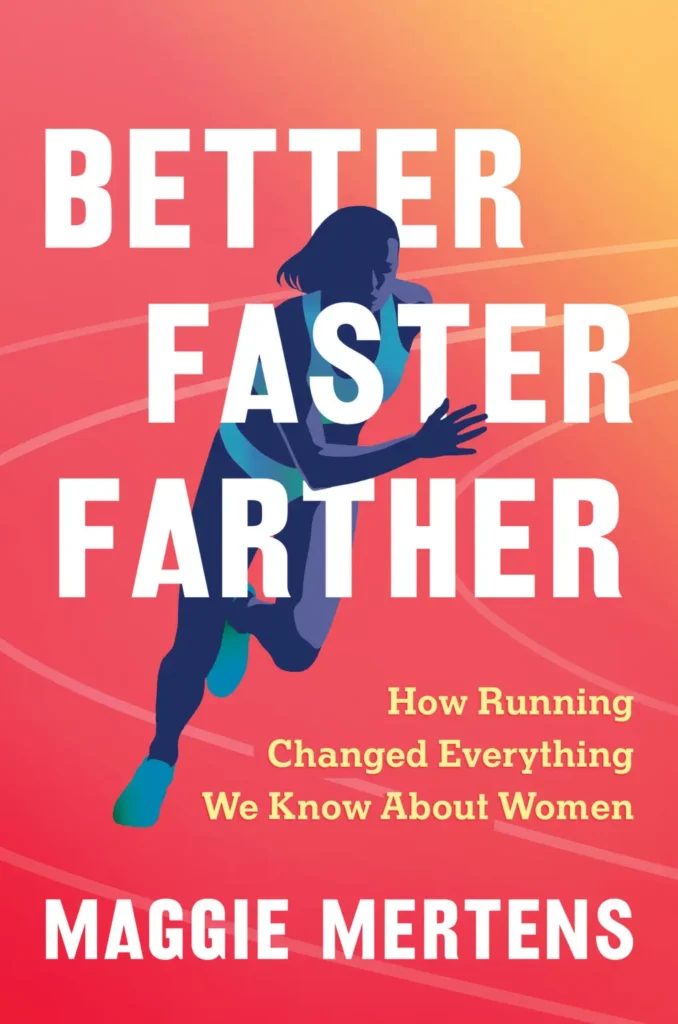
In June 2024, Maggie Mertens book Better Faster Farther: How Running Changed Everything We Know About Women will be published by Algonquin Books. Here is an exclusive interview with the author followed by an excerpt from Mertens’ book.
LtW: The opening line of your book – “women have always been able to run, but men have been trying to convince us for centuries that we can’t” is a powerful way to start. Do you have a theory why it is that men have tried to suppress women in running and in sport in general?
Maggie Mertens: “My theory is that misogyny is a powerful force. And a lot of it, I think, goes back to a fear about up-ending traditional family structures, which allow men to have the power in the home and also outside of the home. That was based on the idea that men are innately powerful and innately born to be the people in charge. And women were born to be the people who did men’s bidding and had their children. When we talk about sports, it’s easy to forget that sports were really a way for men to prove their masculinity to the world. And that masculinity gets started to get questioned if women are allowed to do the same things.
LtW: In the early chapters of the book, you tell the story of Stamata Revithi who ran the course of the first marathon in the modern Olympics after being tricked by the organisers. It’s such a horrible injustice. To what extent do you think that that that women’s need to fight for equality has changed since the 1800s?
MM: That’s a good question. Even while writing the book I had to step back every now and then and remember that obviously today it isn’t the same. Now we have the Olympic women’s marathon, we have professional women athletes who are respected. But at the same time there is a lot of still inequality. We have a lot of gender inequality that’s playing out in the political world with reproductive rights and those kinds of things being taken away. Also, the [lack of] media attention, pay inequality, contracts, those kinds of things for women athletes. Those are meaningful. There has been access granted on some levels. But I still don’t think that we still see men and women as physically equal or equitable.
LtW: How can men be allies to women in sport?
MM: I think the easiest answer is to appreciate women’s sport. And to stop this constant narrative that I think a lot of men are fed: that [women’s sport] must be something that’s put down in order for men’s sport to remain the best and the most important. But I’ve seen incredible changes just in the men that I know and the men in my life. I think especially in the running community, you have a lot of support for both men and women runners and I found that there’s seems to be a lot of mutual respect. Stop trying to compare everything to men constantly. And that’s the beautiful part about sport: we are just watching this very beautiful part of humanity.
LtW: What do you see in the running world today that makes you more optimistic about women’s place in in running?

MM: Oh, a lot. I mean, ‘a lot’ a lot. I think of some of the women that are making headlines. I just loved watching the Olympic trials marathon. The headlines were so much more exciting about the women and it did feel like everyone’s really watching this. I was speaking with someone at a women’s sports bar and they were saying that they held a viewing party for the marathon trials. Athletes like Sidney McLaughlin. Sha’Carri Richardson. I think the Olympics are going to be very exciting. Also, just talking to people about this book and seeing how excited women who are casual runners get.
I touched on this in the book. My mom was born in 1955. That was still the era when women were told ‘you cannot physically run a marathon’. So it is very hopeful to me that we’ve shifted so much, so quickly, in terms of what we literally thought was impossible to now proving ourselves on a very universal stage.
Excerpt from Better Faster Farther
Women have always been able to run, but men have been trying to convince us for centuries that we can’t.
In the first modern Olympic Games, one event epitomized manli- ness: the marathon. The 26.2-mile race was not an original component of the ancient Olympic Games, but a kind of tribute to the masculinity of the ancient Greeks just the same. The marathon is so named for the Athenian soldier who, supposedly, ran all the way back to Athens after the Battle of Marathon to announce “We won!” after the Athenian army beat the Persian invaders, a turning point in the Grecian-Persian wars that helped lead to the rise of the Classical Greek civilization. According to some accounts, this man died of exhaustion as soon as he made his announcement. Such was the difficulty of the 40-kilometer run from Marathon to Athens. What better way to honor the classic Greeks than with this: essentially the reenactment of a war story. A feat of manliness if ever there was one.
Then, a woman asked to be registered.
This woman, known as Stamata Revithi, a poor single mother, was a woman obsessed. She had been walking to Athens from Piraeus with her seventeen-month-old baby in the weeks before the marathon, seeking a better life for herself and her child. A traveler on the same path asked why she was walking so far, on foot, with her young child in her arms. “Where should I find the fare? I have no money” was her answer. When the traveler gave her some money, he also made a suggestion that she should try the upcoming marathon. Perhaps he meant it as a means of making money, gaining fame, or merely because Revithi looked like she could run, judging by her walking a 10-kilometer route while carrying a toddler.
When French baron Pierre de Coubertin wanted to revive the modern Olympic Games at the end of the nineteenth century, he framed the need for them as a way to better the world, to promote world peace. “It is clear that the telegraph, railways, the telephone, the passionate research in science, congresses and exhibitions have done more for peace than any treaty or diplomatic convention,” Coubertin said at a speech in 1892. “Well, I hope that athletics will do even more. Those who have seen 30,000 people running through the rain to attend a football match will not think that I am exaggerating.” Coubertin wanted to build a better world through sports.
But this better, more peaceful world didn’t include women. Not in the sports part, anyway. He wanted to bring back the Olympic Games “for the solemn and periodic exaltation of male athleticism . . . with the applause of women as reward.” Later, as the president of the first ever International Olympic Committee, he doubled down on the idea of women’s (lack of) place in the Games: “Women have but one task, that of the role of crown- ing the winner with garlands . . . in public competitions, women’s partici- pation must be absolutely prohibited. It is indecent that spectators should be exposed to the risk of seeing the body of a woman being smashed before their eyes. Besides, no matter how toughened a sportswoman may be, her organism is not cut out to sustain certain shocks.”
Needless to say, when those first modern Games took place, in Greece in 1896, there were no women athletic contestants. Women, Coubertin was fond of pointing out, did not participate in the original Olympic Games. They were barred from even entering the stadium as spectators. Participants in those ancient games were nude so as to keep women from even attempting to disguise themselves and sneak in.
Historians have found evidence that ancient Greek women held their own separate games to honor Hera, Zeus’s wife, in which three separate age-groups of young women competed in a foot-race, but that was no matter to Coubertin.
By the 1890s, proving masculine physical prowess through sport was appealing to men like Coubertin because, according to them, the very idea of “masculinity” and what it meant to be a man was being threatened at the time. Women throughout Europe and the West were beginning to organize for greater rights, for the vote, for political power, for the right to be educated and to work in the jobs they had been told were only for men. At the same time, similar organizing was happening in the US, where formerly enslaved Black people were clamoring for more rights in the wake of the Civil War and Reconstruction. In short: what many (white) men saw as the “natural order”—white men on top, women and everyone else at the bottom—was being challenged. Naturally, in the absence of mass war (since Coubertin wanted more peace), sports was the perfect stage on which to perform their masculinity and reassert their physical dominance.
This excerpt is from Maggie Mertens’s new book, “Better Faster Farther: How Running Changed Everything We Know About Women,” which will be published on June 18 by Algonquin Books.
You can order a copy of Better Faster Farther here.

